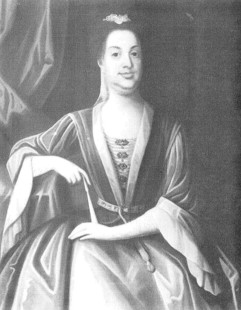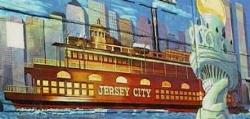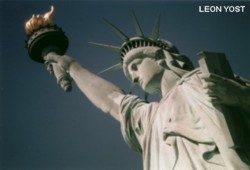 |  |  |
|
| ||
 |  |  |
 |  |  |
|
| ||
 |  |  |
|
|
 Oil painting, painter unknown. |
From Proceedings of the New Jersey Historical Society, January 1965 by Arthur D. Pierce
This Web Version, COPYRIGHT 2004 GET NJ
One of the far-reaching ramifications of Cornbury's precedents was the weakness and ineptitude of the militia, a state which continued until the very outbreak of the Revolution. In 1704, by trickery, Cornbury squeezed a "strong" militia bill through the Assembly. This was done when he questioned the property qualifications of three newly-elected Quaker Assemblymen from West Jersey. This blocked their right to vote long enough for the measure to pass. It required every male between the ages of sixteen and sixty to enlist and muster at least four times a year.
It may be argued that strong Quaker influence in West Jersey foredoomed the colony to military weakness; nevertheless, Cornbury's methods inspired widespread distrust and made that weakness a certainty. Thus two years later the Quakers had their turn. Cornbury's militia bill expired, and when he called upon the Assembly to re-enact it, he might as well have whistled in the wind. Cornbury finally threatened to have all the Quakers in the Assembly disqualified from holding office; but by that time his Lordship had become as unpopular in London as he was in New Jersey and his threats fell flat.
Over succeeding years one governor after another called for a "strong" militia bill, and one Assembly after another paid no attention (with one exception which will be noted). There was, to be sure, a militia in New Jersey, but in name chiefly. Muster calls were ignored. Penalties were unenforced. So unreliable were those who did enlist that British authorities more than once demanded that the Governors obtain "laws punishing mutinies in the militia."
|
Such private domination of the channels of justice was, in itself, a big factor in the new series of riots, one of the worst of which took place in Perth Amboy, the East Jersey capital. More than a hundred men marched on the jail to free a prisoner; assaulted the Sheriff, the magistrates and the constables, and smashed open the jail door with a sledge hammer. Bearing the freed prisoner, the mob "triumphantly marched through the town with Fiddles playing before them ... "
In retrospect the spectacle of a mob led by fiddlers - playing what one can only wonder - seems almost comic. The helplessness of the authorities was not; especially when the Governor begged the Assembly to raise troops and protect the jails, and the Assembly calmly replied that the colony was too poor. The Assembly stood pat, and - save during the French and Indian war, when there were fears of invasion - no troops were raised. The Assembly was still standing pat in 1771 when Governor Franklin asked it to "adopt some such regulations for the Militia as are now established in our Mother Country." The Assembly promptly replied that "the Militia law in force we conceive may be sufficient for all the purposes intended thereby." On the very eve of the Revolution, in March 1774, Crown officials had formally inquired as to the "State and Condition" of New Jersey's defenses. Franklin's report revealed the military helplessness of the colony:
The testing time for loyalty to the King had come; and the wonder is not that the loyalists were few, but that there were so many of them considering how little the Crown had done to earn the respect and fealty of Jerseymen. Many loyalists, of course, were less loyal to the King than they were to their own private interests: Walt Whitman was to observe long years later that "there is no sweeter fat than that which sticks to my own bones." But many loyalists were honestly devout, and they never were able to understand why the greatest military and naval power in the world proved unable to save their fat, their bones, or even their skins. They found it hard to comprehend when New Jersey's Provincial Government disintegrated and dissolved right before their eyes. No time to recall then that the foundations of that government had been laid on sand, by a governor in skirts.
| Sources for this paper are, in large part, the New Jersey Archives; Rev. Dr. George Morgan Hills' History of the Church in Burlington; Carl Bridenbaugh's fine Mitre and Sceptre; Leonard Lundin's Cockpit o f the Revolution; and the British Headquarters Papers in the New York Public Library. |
| Finis |
| A Governor in Skirts First Page |
 Your Ancestors' Story |
 Bruce Springsteen's Jersey Shore Rock Haven! |

|
UrbanTimes.com |